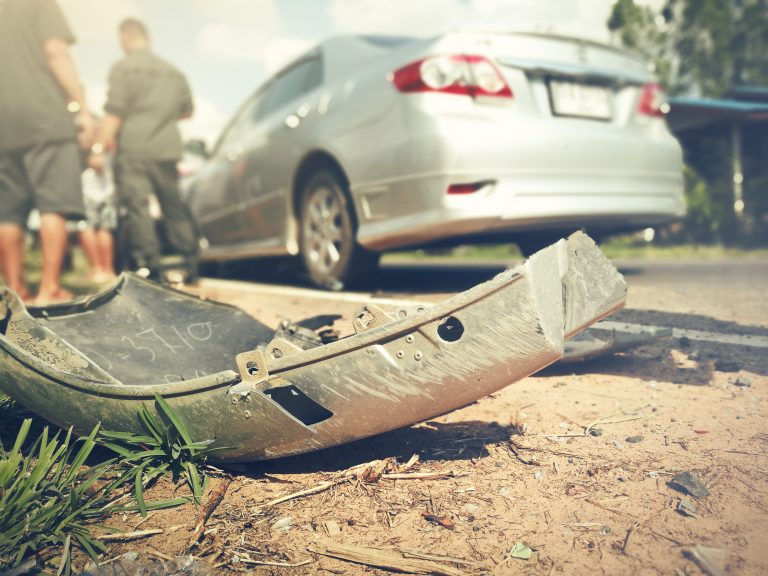Highlights
It's a Shock
Being in a serious car accident can be a scary, violent experience. Assuming everybody involved is okay, there’s still a lingering shock and confusion in the aftermath. It’s important to collect yourself, stay focused, and remember that you have some information to gather.
We’ll cover what you should do immediately after the accident, the information you need to collect, who you should talk to, and what to expect from your insurance carrier.
Make Sure You're Safe
Accidents can happen anywhere, but they’re more likely to happen in places with high traffic density. If you’re on a busy street like this and not too injured to move, evacuate the vehicle and move to a safer area like the sidewalk until you gather your faculties. If you are unable to move due to the car damage boxing you in or a serious injury, stay put until help arrives. If your vehicle is causing a major problem or at risk of being hit by oncoming traffic, try to alert others to assist moving your vehicle out of harm’s way.
If you were able to exit your vehicle and enter a safe place, make sure that anyone else involved is not in dire need of medical attention. If they are, it’s incredibly important that you do not move them from where they are, unless they’re trapped in a burning vehicle or exposed to the possibility of immediate death. It seems cruel not to help someone that’s terribly injured, but moving them could provoke further injury if they are bleeding internally or have an unstable back injury. Wait for first responders to arrive at the scene and do their jobs.
This is a play-by-play for a serious accident. Most accidents are not this serious, and the parties involved are able to communicate afterwards.
Gather Information
If the accident was not too serious, start focusing on what information you need to collect from the other party, and what information you are obligated to give to them. Try not to discuss your feelings or place blame upon anyone, including yourself. The police will arrive (if they haven’t, they should be notified to take witness statements), and an investigation will be launched by your insurance company. You do not want to accidentally incriminate yourself by telling the other party that the accident was entirely your fault.
Often, both parties are somewhat at-fault. Even if you were performing an illegal action, there is still a chance that the other driver was also not obeying all traffic laws. Additionally, if you admit fault 100%, you will not be covered by your insurance carrier for damages. There is a stipulation within each auto insurance contract that states you cannot be provided coverage in the event you admit guilt.
Here’s what you should collect from other parties:
- Names of everyone involved, including passengers and witnesses
- Contact information (phone numbers and e-mail addresses if possible) of everyone involved
- Insurance companies and policy numbers of others involved in the accident
- Make and model of all vehicles involved
- VIN Numbers
- License Plate Numbers
- Street and address of accident, or cross-streets if the accident occurred in an intersection
- Direction vehicles were travelling
- Names and badge numbers of officers on-scene, if any
Take photos!
To help your insurance carrier determine culpability for the accident, take photos of the accident and vehicle damages. This will be especially useful if the pictures are taken before the vehicles have been moved out of the roadway, because it paints a better scene of how the accident played out. Also, you’re providing a quicker route for your carrier to determine damage estimates and you’ll receive compensation for repairs sooner.
Contact Your Insurance Carrier
Call your insurance carrier as soon as possible after an accident. It’s best to call with all of the information gathered. If the other party was unable to communicate or taken to the hospital, you should still call. Calling in your claim ASAP shows good faith to your carrier and will help your claims process go smoother.
Be Honest
If the police are called to the scene, you and all parties will be required to make a statement. The statements and physical evidence at the accident will be key factors for your insurance carrier’s investigation. This should be obvious, but do not make false statements to the police or your insurance carrier in an attempt to deflect blame. There will likely be other witnesses, traffic cameras, or facts evident from vehicle damage that will refute your false claims.
When you are found lying in your statements, you can be convicted of perjury if prosecuted by authorities. You can also be convicted of attempted insurance fraud, and may end up paying hefty fines or even serving jail time. It’s not worth it.
Get Medical Attention
Assuming you were not gravely injured in your accident, a visit to the hospital is still a good idea. Your adrenaline will be high, you might be in shock, and that can mask injuries that you don’t even know about. Medical professionals will be able to deduce if you have issues that should be tended to. The adrenaline and shock will eventually wear off, and a hospital is the safest place to be when it happens.
Your insurance does not primarily cover medical expenses, but there is an endorsement called “Medical Payments” that can be purchased for a small amount of additional premium. Insurance carriers offer anywhere from $250 to $2500 or more in coverage, and it can be accessed immediately when needed. Medical Payments are especially useful for paying health insurance deductibles if you plan on taking an ambulance ride or visiting the emergency room.
Be Prepared Next Time
People don’t believe they’ll ever be in an accident because they’re responsible drivers or have a good luck streak. This is wishful thinking. You simply can’t predict what other drivers on the road are doing or if they’re preoccupied. According to the auto industry’s accident statistics, the average person will be involved in about four accidents in their lifetime.
Your best bet is to always be ready. It’s very simple to prepare for it:
- Download and print out an accident report form from your state’s DMV website and fold it up in your glove box. This is a super easy way to remember what information to gather, because it’s all on the form.
- Keep your phone charged and secured anytime you’re driving your vehicle. If your phone is dead or broken, you won’t be able to contact your loved ones, the authorities, or your insurance carrier.
- Stow a medical kit somewhere in your car to assist yourself with minor cuts or gashes.
- Install a dash camera. This is a little extreme, but consider getting one installed if you drive a commercial vehicle or live in an area riddled with traffic problems. It can save you a ton of headache when the other party was obviously at-fault and you have it on film.
Speak With an Agent
(909) 944-9022
Check out our Facebook page for future blog post alerts:
Frequently Asked Questions
I know I was at-fault for an accident, do I have to pay for my car repairs?
In this scenario, it’s a good idea to compare whether or not your insurance carrier should pay for your repairs at all. If the repairs are inexpensive, it could be worth paying out-of-pocket so your rates do not increase.
What happens when my car is totaled?
It’s not a good idea to assume your car is totaled until your insurance carrier has verified the repair estimates will equal more than their “totaled threshold”. The threshold percentage is usually 75% of your car’s value, but it varies between carriers. Wait for them to perform their investigation before jumping to any conclusions.
You will be paid for either the repairs, or for a percentage of the Actual Cash Value of your vehicle before it was totaled.


